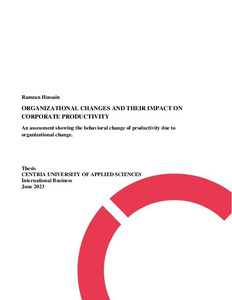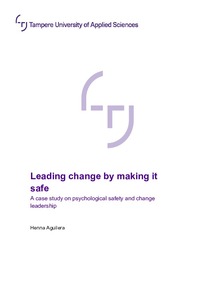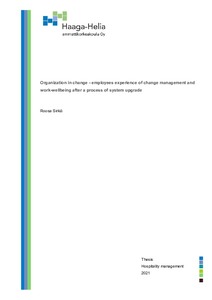Resistance to -systemic sustainable- change in decision makers of cities and industries : causes and possible ways to overcome it, in a Latin-American developing environment
Mejía Villegas, Lorena (2022)
Mejía Villegas, Lorena
2022
Julkaisun pysyvä osoite on
https://urn.fi/URN:NBN:fi:amk-2022110822286
https://urn.fi/URN:NBN:fi:amk-2022110822286
Tiivistelmä
This is a qualitative study that aims to expose and explain the relationship between Sustainable Management and Resistance to change, providing useful information, tools and skills to identify, understand, and manage this resistance in the decision making system, appreciating its relevance in the structural inaction in the face of the climatic and ecological crisis, specially in the national context of Colombia.
The conceptual proposal is based on Harich's statement (2010) about the fact that the resistance to change of the system itself is the root of the great global environmental challenges. A Literature Review was carried out to learn about the background and relationships between the concepts of Sustainability Management, Change Agency, and Resistance to Change, as well as the sometimes less obvious Barriers to sustainability and the low-carbon transition, such as private interests. Through the interview and survey methods, experts, decision makers, consultants and others who work influencing the implementation of sustainability high impact solutions and policies, participated in order to confirm and complement the findings of the literature from the professional practice. The most important barriers to making sustainable decisions can be framed in fear, hidden or secondary interests based on the preponderance of the economic aspect, and established thought models and paradigms, especially the inflexible legal frameworks that perpetuate status quo and hinder innovation.
The conclusions advise how the main tools: knowledge and strategy, pedagogy and communication, participation and transparency, can contribute to transforming the institutional and legal framework, and therefore, the market and the economic model.
Finally, the recommendations mention the issues related to this study, but not addressed in it, and that may be key to developing the theoretical framework such as the types of sustainable leaderships or management, which sector is most resistant to change, and which strategies are being used with greater and lesser success to manage systemic and sustainable change.
The conceptual proposal is based on Harich's statement (2010) about the fact that the resistance to change of the system itself is the root of the great global environmental challenges. A Literature Review was carried out to learn about the background and relationships between the concepts of Sustainability Management, Change Agency, and Resistance to Change, as well as the sometimes less obvious Barriers to sustainability and the low-carbon transition, such as private interests. Through the interview and survey methods, experts, decision makers, consultants and others who work influencing the implementation of sustainability high impact solutions and policies, participated in order to confirm and complement the findings of the literature from the professional practice. The most important barriers to making sustainable decisions can be framed in fear, hidden or secondary interests based on the preponderance of the economic aspect, and established thought models and paradigms, especially the inflexible legal frameworks that perpetuate status quo and hinder innovation.
The conclusions advise how the main tools: knowledge and strategy, pedagogy and communication, participation and transparency, can contribute to transforming the institutional and legal framework, and therefore, the market and the economic model.
Finally, the recommendations mention the issues related to this study, but not addressed in it, and that may be key to developing the theoretical framework such as the types of sustainable leaderships or management, which sector is most resistant to change, and which strategies are being used with greater and lesser success to manage systemic and sustainable change.
Kokoelmat
Samankaltainen aineisto
Näytetään aineisto, joilla on samankaltaisia nimekkeitä, tekijöitä tai asiasanoja.
-
Organizational changes and their impact on corporate productivity : An assessment showing the behavioral change of productivity due to organizational change
Hussain, Ramzan (2023)This thesis paper aims to analyze the impact of organizational change on productivity, as the reason for sustaining and motivating the operation of an organization lies in gaining more profit through increased productivity. ... -
Leading change by making it safe : a case study on psychological safety and change leadership
Aguilera, Henna (2020)Muutosten keskiössä ovat usein ne ihmiset joihin muutos vaikuttaa, sillä heidän tulee sopeutua uuteen tilanteeseen. Tämä sopeutuminen taas voi tuoda mukanaan hämmennyksen, epävarmuuden ja jopa pelon tunteita. Kun tiimiä ... -
Organization in change - employees experience of change management and work-wellbeing after a process of system upgrade
Sirkiä, Roosa (2021)Changes are part of today’s business. Organizations are constantly going through processes where things are developed, renewed and changed. Changes can be anything from lay-offs to IT-system upgrades or implementing new ...



